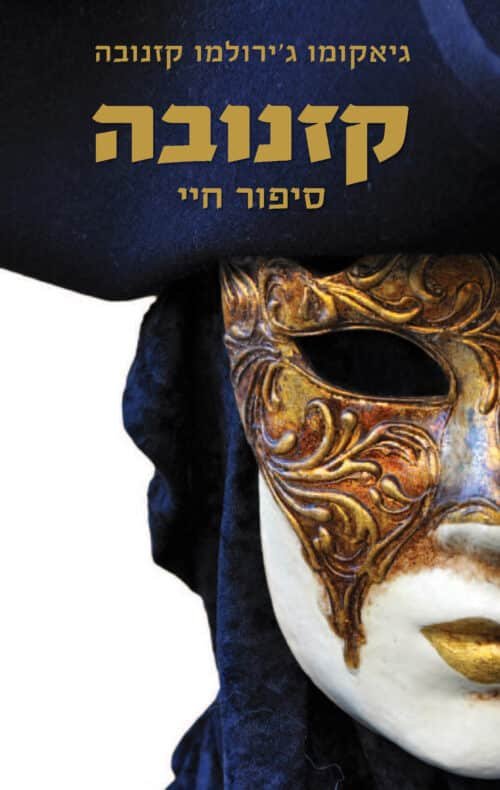Please scroll down for an English review.
"כל חיי נועדתי להיות קורבן לחושיי הרגישים, וזאת על אף היסודות המוסריים המצוינים, פרי העקרונות הנעלים, שהושרשו בלבי. התמלאתי עונג בהלכי בדרך נלוזה, ולא חדלתי מלחיות את שגיאותיי, ובלבי הנחמה כי ידעתי מהן. אי־לכך תקווה אני, קוראים יקרים, שלא תמצאו בסיפורי התפארות עזת־מצח, ואף לא הרהורי חרטה או מבוכה של מי אשר מעלה סומק בלחייו בהתוודותו על חטאיו הקלים."
קזנובה, אחד האישים המפורסמים במאה ה – 18 באירופה. נולד למשפחה פשוטת עם, למד משפטים ובעת סיום לימודיו (בגיל 16) החל את דרכו בכנסייה.
את זיכרונותיו הוא כותב כאשר הוא בן 49, כאשר הוא בגלות מוונציה אליה הוא לא יכול לשוב ומשמש כספרן בבוהמיה. הוא שבע מהנדודים וההרפתקאות שלו ברחבי אירופה, אבל בו בעת מתוסכל מגלותו.
"חשתי כי מיום לידתי נועדתי למין היפה, תמיד אהבתי נשים ועשיתי כמיטב יכולתי כדי לזכות באהבתן. "
הקריאה בספר מגלה דמות של אדם חובב סיכונים, הרפתקאות ואדרנלין. יחסיו עם נשים הם דגם לתבנית חייו, בפרפרזה לדברי יוליוס קיסר – באתי, ראיתי, כבשתי. ואני אוסיף על כך – ברחתי.
הכיבושים שלו לעיתים מבוצעים בלשון חנופה ומתק שפתיים ולעיתים בכוחניות. כאשר אין ברירה הוא קונה את הכיבושים שלו בכסף. לפעמים בריחתו מצליחה והוא לא נתקל במהמורות, לפעמים הוא סופג במהלך הבריחה חבטות ויוצא מהסיטואציה בשן ועין. לא פעם ולא פעמיים הקוראת הנדהמת (אני) למדה הכיבושים עלו לו במחלות מין, מכות וגם הזמנות לדו קרב (לפחות במקרה אחד הוא בטעות הרג את מי שהתמודד מולו).
סיפורי הנשים וההימורים חד הם: בהתחלה הם מרתקים ומשעשעים. השפה הציורית מוסיפה תבלין לקריאה. אבל, ככל שמתקדמים בספר הסיפורים מתערבבים, ובכל הרפתקאה כספית מעורבת גם הרפתקה מינית (שעליה הוא מצהיר שההתאהבות באותה אישה שינתה את חייו מהיסוד), והסיום של ההרפתקאות צפויי וזהה. קזנובה נאלץ לברוח בחופזה פן יבולע לו ופתיל חייו יקופד.
יתכן שזו אשמת העורך שבחר לקבץ בספר קטעים מתוך 12 הכרכים של כתביו.
הסיפור המעניין ביותר לטעמי הוא סיפור בריחתו מהכלא בוונציה. לאחר שנכלא בגין ההרפתקאות הכלכליות שלו שהיו לצנינים בעיניי האינקוויזיציה.
מעניין גם האופן שבו קזנובה חוזר וממציא את עצמו מחדש: מדינה חדשה/ עיר חדשה, מערכת יחסים חדשה, נשים חדשות ולעיתים גם שם חדש והחשוב ביותר תוכניות התעשרות חדשות ומפוקפקות לא פחות מהתוכניות שזנח (או יותר מדוייק לכתוב מהתוכניות שסיבכו אותו ובגינן הוא ברח).
למרות האמור לעיל, יש בספר תיאור אינטימי של בני התקופה והמפגשים של קזנובה עימם. תיאור של הספרה התרבותית באופן לא שיפוטי שמאפשר לבן זמננו להתרשם מאורחותיהם של האירופאים במאה ה- 18. המוסר אינו נר לרגליהם של הטיפוסים שבהם פוגש קזנובה. יחד עם זאת, אני לא חושבת שהוא היה חריג אם רק נזכור את "יחסים מסוכנים" מאת פייר שודרלו דה לאקלו שיצא בערך בתקופת חייו ומצייר את הצביעות וההסתאבות של האליטה הצרפתית. האישיות הססגונית של קזנובה וכשרון הכתיבה שלו משכו אליו תשומת לב ובעיקר נטייתו להגיע למצבי קיצון בגינם הוא נאלץ לברוח מכל מקום אליו הגיע.
מעניינת לא פחות מדמותו הססגונית של הסופר, היא ההיסטוריה של גלגולו של כתב היד –
בשנת 1821, הזיכרונות נמכרו למו"ל גרמני שחשב שהתיאורים בו פוגעים בנפש המוסרית. הוא הוציא מהדורה פוריטנית ומצונזרת ובמשך השנים והגילגולים, שלל התרגומים הסתמכו על מהדורה זו.
המהדורה המתורגמת האותנטית פורסמה לראשונה בין השנים 1960 -1962 ורק בשנת 2010, בעזרתו של תורם אדיב, נרכשו מלוא הזכויות על כתב היד ופורסמה מהדורת פליאדה חדשה.
קזנובה/ גיאקומו ג'ירולמו קזנובה
הוצאת ידיעות ספרים, אסטרולוג, 2014, 576 עמ'
דירוג SIVI –
איכות אודיו –

Casanova, a renowned 18th-century European figure, was born into a humble family. He pursued a career in law and entered the church at the age of 16.
At 49, he writes his memoirs while in exile from Venice, a place he cannot return to. He is currently working as a librarian in Bohemia. He is tired of constant traveling and adventures throughout Europe but also feels frustrated because he cannot return to Venice.
When you read the book, you gain insight into the main character's personality—someone who loves taking risks, embarking on adventures, and seeking thrilling experiences. His interactions with women reflect his approach to life, as he pursues them with confidence and determination, akin to Julius Caesar's famous saying, 'I came, I saw, I conquered.' However, he also tends to move on quickly, as if he is running away from something.
He achieves his conquests through various strategies. At times, he employs flattering language and sweet talk, while he resorts to force at other moments. In some instances, he even pays for his conquests. The success of his escape fluctuates—sometimes, he gets away quickly, but other times, he faces difficulties and has injuries. More than once, he has suffered from venereal diseases, beatings, and even invitations to duels. On one occasion, he accidentally killed someone who challenged him to a duel.
The women's stories and stakes are the same: they are captivating and enjoyable initially, and the vivid language adds interest to the reading experience. However, as you progress through the book, the narratives become tangled. Each financial adventure includes a sexual escapade (in which he states that falling in love with that woman changed his life fundamentally). The conclusion of these adventures is predictable and repetitive. Casanova had to flee quickly to avoid being consumed and having the spark of his life extinguished.
It may have been the editor's fault that excerpts from his 12 volumes of writings were collected into a book.
In my opinion, his most exciting story is his escape from prison in Venice. He was imprisoned for his financial adventures, which the Inquisition frowned upon.
It's fascinating how Casanova reemerges and recreates himself with each new adventure: he moves to a new country or city, begins a new relationship, meets new women, and occasionally adopts a new name. What's most striking, though, is his tendency to pursue new and often questionable schemes for getting rich, no less risky than the ones he previously abandoned or, more accurately, fled from.
Despite those above, the book provides an intimate portrayal of the people of the 18th century and their encounters with Casanova. It describes the cultural literature of the time in a non-judgmental way, allowing contemporary readers to gain an impression of the European lifestyle. The morality of the people Casanova meets is not put under scrutiny. However, it is essential to note that he was not an exception to the norm, as exemplified by "Dangerous Liaisons" by Pierre Chaudrelot de Laclou, which portrays the hypocrisy and indulgence of the French elite around the same period. Casanova's colorful personality and writing talent made him a noteworthy figure, mainly due to his tendency to find himself in extreme situations that forced him to flee from place to place.
The history of the manuscript's creation is as fascinating as the writer's character.
In 1821, a German publisher bought the memoirs and believed their descriptions harmed moral values. As a result, he released a censored and puritanical edition. Subsequently, many translations have been based on this edited version over the years.
A kind donor helped acquire the full rights to the manuscript, and a new Pleiades edition was published in 2010 after the authentic translated edition was first published between 1960 and 1962.
לגלות עוד מהאתר Sivi's Books
Subscribe to get the latest posts sent to your email.

